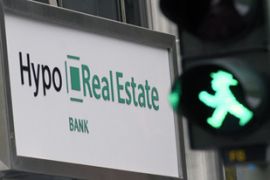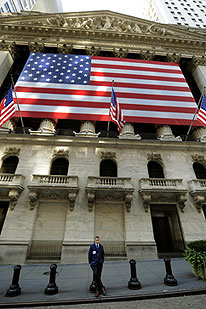US stocks fall amid global sell-off
Dow Jones falls below 10,000 points after slides in European and Asian stock markets.

For the year to date, the Dow is down about 25 per cent, the S&P 500 is down 28 per cent and the Nasdaq is down 29.8 per cent.
European stocks
By the close of trading in Europe, French stocks had fallen 9.04 per cent and the German DAX was down 7.07 per cent.
London’s FTSE 100 suffered its third biggest ever one-day fall, dropping 7.85 per cent.
Japan’s Nikkei index dived nearly five per cent earlier on Monday to its lowest point in more than four years, and stocks all across the region followed suit.
 |
| The $700bn rescue bill has failed to rally Wall Street [AFP] |
The US president said it will take time for the financial rescue bill to be put into place and confidence to return to financial markets.
“I believe this plan will work over time,” George Bush said in Cincinnati on Monday.
Earlier, in San Antonio, Bush personally cautioned the small business owners that the bailout plan would take time.
“It’s going to take a while to get in place a programme that, one, is effective and, two, doesn’t waste taxpayers’ money,” he said.
We don’t want to rush into this situation and not have the programme be effective.”
For its part, the US treasury department named on Monday a former Goldman Sachs executive to oversee spending the $700bn earmarked for the rescue plan and pledged to work with other countries to calm global financial markets.
The US administration announced that it had chosen Neel Kashkari, an assistant treasury secretary for international affairs, to head the treasury’s new Office of Financial Stability on an interim basis.
Kashkari, 35, helped draft the bailout legislation as a close adviser of Henry Paulson, the treasury secretary.
John Terrett, Al Jazeera’s correspondent in New York, said: “There is serious consideration here that the $700bn bailout rescue package is not enough.
“The Libor, the rate at which banks lend money to each other, has gone up on Monday which wasn’t supposed to happen.
“The Federal Reserve is throwing everything and the kitchen sink at this. The issue is impinging on the lives of ordinary Americans and people here are very concerned about it.”
In free fall
Reflecting on the European markets as a whole, Nicole Elliott, a technical analyst with Mizuho Securities, said: “It’s just in free fall. The outlook is still very bearish and we are nowhere near the bottom. There is no reason to buy anything at the moment.
John Haynes, strategist at Rensburg Sheppard Investment Management, said: “People have decided that markets have no ability to repair themselves and politicians have control of this process. The buyers have stepped away, and the sellers are still there.”
Amid the turbulence, the euro fell heavily against the dollar while oil prices dropped below $90 a barrel, their lowest level in eight months.
Trading on Russia’s two main markets was suspended after the ruble-denominated MICEX nosedived more than 15 per cent and dollar-denominated RTS fell 14 per cent.
Meanwhile, Iceland’s stock market suspended trading in all financial shares, including its three biggest banks, amid reports of a government rescue of the stricken banking sector.
Trading in Kaupthing, Landsbanki and Glitnir banks and other finance stocks was halted at 1000 GMT.
Geir Haarde, Iceland’s prime minister, was said to be consulting opposition party leaders to discuss efforts to reassure investors.
The government last week acquired 75 per cent of Glitnir, the country’s third largest bank.
Iceland is particularly vulnerable to worldwide financial turmoil as the finance sector represents a major part of the island’s economy, eight times its gross domestic product.
‘Miserable’
“It’s a miserable state of affairs. And then you add to that the banking problems we’ve seen over the weekend,” Henk Potts, strategist at Barclays Stockbrokers, said.
“There’s the bailout plan, which is good news, but there’s uncertainty over the price at which assets are going to be bought. And the reality is that it will take some time to see the benefit.”
|
“It’s a miserable state of affairs. And then you add to that the banking problems we’ve seen over the weekend” |
Countries around the world have taken a number of measures aimed at calming the crisis but they seem to have done little for investors’ nerves as they fled to government bonds, gold and the low-yielding yen.
The German government stepped in to rescue ailing mortgage lender Hypo Real Estate on Sunday after opposing a Europe-wide bailout similar to that adopted in the US.
Angela Merkel, the German chancellor, also pledged that the country would also offer an unlimited guarantee for all private savings accounts. She had previosuly criticised moves by Ireland and Greece to guarantee deposits.
“We tell all savings account holders that your deposits are safe. The federal government assures it,” she said after an emergency government meeting called in an attempt to prevent a run on the banks.
So far, Britain has avoided pledging to guarantee all desposits in its banks, but the country’s third largest party said on Monday that such a move was inevitable.
“Ireland’s action last week to guarantee all deposits made a common European approach to deposit guarantees necessary. Germany’s decision today makes it completely unavoidable,” Nick Clegg, the Liberal Democrat leader, said.
Emergency meeting
British officials will discuss the financial crisis in a meeting of the new emergency economy committee on Monday, with Alistair Darling, the finance minister, reportedly considering using public funds to take stakes in banks to help shore them up.
The plan would steer a middle course between full nationalisation of banks, such as that used to save Northern Rock and Bradford & Bingley, and the provision of further loans.
Denmark and Sweden have also moved to improve the protection of bank accounts, with Copenhagen announcing that commercial lenders had agreed to contribute about $6.4bn to a fund that will help insure account holders from losses.
In Sweden, the government said it would raise the limit for deposit insurance to $71,000. Austria is also expected to consider guaranteeing bank deposits.